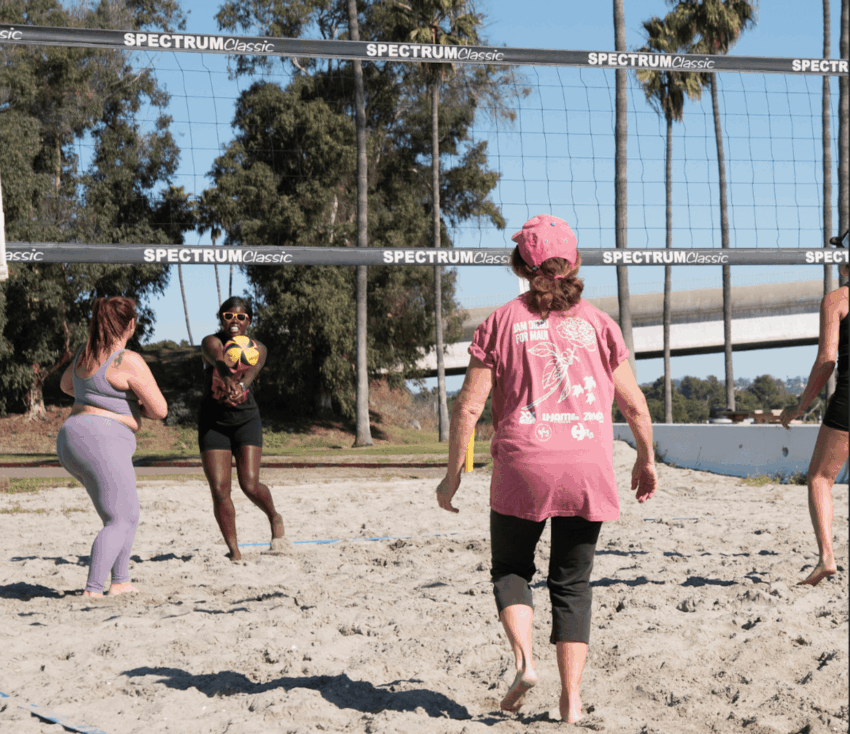Dan “Pal” Palenchar started playing volleyball after moving to San Diego from the Northeast. What began as a casual meetup with friends eventually grew into the Life’s A Beach Volleyball Club, a league that attracts about 1,000 adult players a year.
Now, Palenchar is considering the league’s future. “We very likely won’t be able to offer leagues at all because they’re just too expensive,” he said. He’s weighing his options: increasing fees for teams or shifting to focus solely on donation-based programming, where players show up and learn how to play.
The challenges come after the City Council increased fees starting July 1 for adult sports leagues using city parks. Youth and nonprofit leagues are exempt. This move came as the council implemented a series of price increases in an effort to balance this year’s budget.
The city estimated that the fee increase would generate $760,000 in revenue, though this does not account for potentially reduced participation. “The fees had not been raised incrementally, so this was not an insignificant increase,” said City Council President Joe LaCava.
LaCava explained that the rationale behind the increase was to recover the true cost of providing recreational facilities for the leagues. Otherwise, the city is essentially subsidizing them.
Some leagues felt the city’s proposed true cost seemed too high, with certain Parks & Recreation fields now costing more than private facilities. Jackson Stoever, operations director at Volo Sports San Diego, said that 60 to 70% of their games are played at Parks & Recreation Centers, but they are now exploring the possibility of moving to private venues.
LaCava said the city plans to conduct another cost-of-service study over the next year and may consider midyear fee adjustments if the impact proves too great.
Some leagues felt the impact immediately. Kevin Hellman, who runs San Diego Softball, lost a team that had played with him for 20 years. “Many teams are going outside of the city already because of the higher costs,” he said. “They’d rather make the drive than pay double the money.”
Rob Powell, president of San Diego Basketball, reported that his league has lost more than half of its teams. “I’m looking at having to restructure, or switch to youth basketball leagues and cancel adult basketball leagues,” he said.
Volo, which serves between 25,000 and 30,000 players locally, hasn’t seen a large decline in players, but some leagues that traditionally sell out have not. As a larger operation, they have more flexibility to make adjustments. Volo increased some fees but tried to extend seasons to keep the same price per game. They’re also cutting costs on equipment and staffing where possible.
LaCava said he will advocate for solutions to make the fees more manageable. The city is considering tiered fees to differentiate between larger and smaller businesses or charging leagues based on revenue.
“If the break-even cost is too high and it’s discouraging, maybe we should subsidize this particular program to ensure it is successful at serving the public,” LaCava said.
League organizers emphasize the wellness benefits of their programming. Many participants use the leagues as a way to keep fit and enjoy social connections.
“People use this as a release, you know, as their weekly exercise, as a chance to get out and be with their friends,” said Powell.
Stoever and Palenchar also highlighted how adult leagues provide a great way for people to make new friends. “A lot of people have told us stories about how we’ve become like a second family when they’ve moved here,” Palenchar said.
Hellman noted the broader impact of lost leagues: after games, teams often go out to eat or drink, supporting local businesses and generating sales tax revenue.
He has met with several city council members and recognizes that they don’t intend to shut down small businesses. “The city council is trying to do everything they can to close the budget gap. But it gets to a point where people can’t afford it,” he said.
LaCava acknowledged that difficult choices lie ahead in the upcoming budget season.
Core services such as public safety and keeping libraries and recreation centers open will continue to be the priority.
“Then, as much room as we have to facilitate users of our facilities going forward, we’re thinking about how we very carefully and thoughtfully balance all that together,” he said.
As the city monitors participation and revenue, the coming months will test the balance between financial sustainability and community wellness in San Diego’s adult sports leagues.
https://timesofsandiego.com/politics/2025/10/21/san-diego-adult-sports-leagues-feel-pinch-fee-hike/
